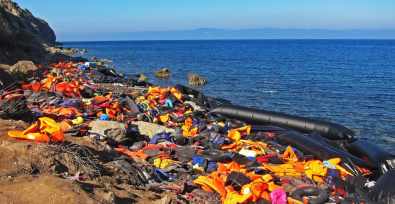In 2022 the former U.K. government made a ministerial change with supporting legislation that seemed on paper quite minor. However, Open Democracy reports that this “minor” change wrongly equated modern slavery to migration. Two years later, there have been horrifying consequences for migrants and modern slavery survivors.
“I wasn’t guilty, but I was in prison anyway”
It didn’t seem like a huge change when the Home Office stripped the safeguarding minister of the modern slavery brief and moved it into the portfolio of the illegal immigration and asylum minister. But the effects have been lifechanging for many.
Samyar Bani is an Iranian refugee who travelled to the U.K. in a dinghy. He is just one of many who found themselves criminalized for activities which should be protected. Samyar and the others he was traveling with couldn’t afford smugglers fees so they pooled their money to buy their own dinghy. They each took turns to steer the craft to England’s shores. But as they approached land the police rounded them up, took them to a hotel and later that night came back to arrest Samyar for people smuggling.
Samyar said:
“I thought my human rights would be respected here…but they put my hands behind my back and arrested me. Prison is bad for everybody. But for people who are not guilty, it’s so much worse. All the time, you’re thinking, why am I here?”
The shift to equate modern slavery with migration has had a major devastating impact. One of the biggest is that refugees and potential slavery victims born outside of the U.K. are struggling to access support. That means some end up wrongly imprisoned, like Samyar. While others become trapped in modern slavery on arrival as they get pushed into criminal exploitation, often followed by deportation.
“I sat in the wrong place in the dinghy…that was enough”
For Samyar, the police ordered someone to take the tiller of the dinghy to steer it to the shore. Then the police labeled him a people smuggler. He was not asked any questions, they just put him in jail. Samyar said while in prison he kept thinking the police would realize they made a mistake, that they would release him and apologize for wrongly imprisoning him. Instead, he was treated like a criminal.
Samyar recounted:
“I wasn’t in command of this trip. I’m not a boat driver – I don’t even know how to swim, and I’d never seen a boat before the day we bought one. But I sat in the wrong place in the dinghy, near the engine, and ended up touching the tiller for maybe four or five seconds. That’s it. But that was enough.”
In Samyar’s opinion, the police knew he wasn’t a smuggler. But they pretended to think he was a criminal, as they do in many other cases, to justify closing the border to refugees.
Samyar stated:
“(In Iran) I was scared that the government would arrest me and kill me. Then I came to England, and it was the same thing I was afraid of in Iran. I wasn’t guilty, but I was in prison anyway.”
It wasn’t until December of 2021 that Samyar was finally acquitted of all charges. The appeals judge stated the law had been incorrectly interpreted. Further, that the group had intentionally been picked up by police before disembarking on U.K. shores to deny them access to support once in the U.K. When refugees and survivors are denied access to services due to a lack of refugee status or a visa, they become extremely vulnerable to human trafficking and forced criminality.
Equating modern slavery and migration must stop!
Samyar feels the current situation does not protect human rights. In his opinion, a better plan would be a visa for refugees, so they don’t have to make a dangerous journey in dinghies in the first place. Marija Jovanovic, a human rights lawyer and University of Oxford stated that modern slavery is closely linked to the issue of migration. Regular and irregular migrants (like Samyar) are intrinsically more vulnerable to exploitation due to their status as migrants.
However, Jovanovic further states:
“Modern slavery is equally closely related to labor market regulation, international trade and supply chain regulation, as well as criminal justice system, and there is no reason why an immigration lens should be a predominant or the only way of seeing and tackling this complex issue.”
Samyar says he didn’t want to sit in the dinghy to come to U.K. But he didn’t have a choice, Iran was no longer safe for him. He left his father, mother, wife and daughter not for money. He came to the U.K. to find safety and because he thought the U.K. had a greater respect for human rights than Iran. But now he feels that is just an empty wish.
Treating modern slavery as an immigration issue, rather than a safeguarding concern, is causing harm to both migrants and survivors. Freedom United and Open Democracy stand side by side in calling on the new government to prevent more wrongful arrests and to stop equating migration and modern slavery. If you haven’t already, add your voice to those calling for an end to the criminalization of migration.





Freedom United is interested in hearing from our community and welcomes relevant, informed comments, advice, and insights that advance the conversation around our campaigns and advocacy. We value inclusivity and respect within our community. To be approved, your comments should be civil.